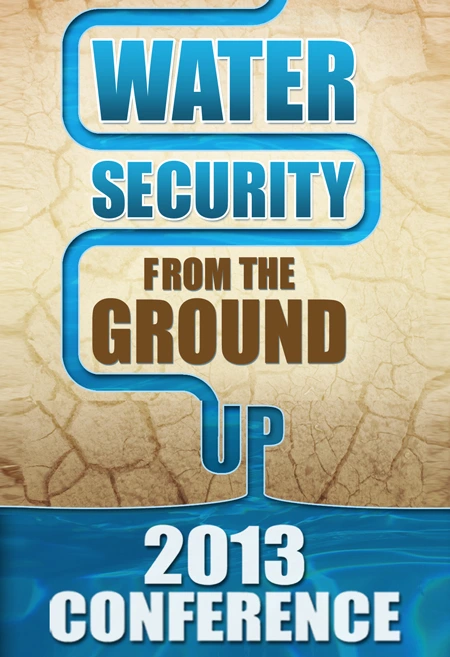Public Policy Review

When planning the Water Resources Research Center’s 2013 annual conference on water security, we knew that the definition of water security was complex. We decided we would not define it for the speakers and attendees, but rather let an understanding of water security emerge from the conference discussions themselves.
In the Winter 2013 issue of our Arizona Water Resource newsletter, the guest view by University of Arizona professors Robert Varady and Christopher Scott defined water security as constituting “the sustainable availability of adequate quantities and qualities of water for resilient societies and ecosystems in the face of uncertain global change.” In his conference keynote address, Anthony Cox of the Organisation for Economic Co-operation and Development (OECD) offered that water security entails “maintaining an acceptable level of risks – in terms of water shortage, excess, pollution, and freshwater system resilience – for society and the environment, today and in the future, through the effective and efficient application of water and water-related policies.” By explicitly incorporating the concept of risk, Cox’s definition builds off of that provided by D. Grey and C. W. Sadoff in the journal Water Policy (2007 Volume 9, p. 545), who define water security as “the availability of an acceptable quantity and quality of water for health, livelihoods, ecosystems and production, coupled with an acceptable level of water-related risks to people, environments and economies.”
In Water Security and the Global Water Agenda, an analytical brief issued in 2013 by UN-Water, we find the following definition: “The capacity of a population to safeguard sustainable access to adequate quantities of and acceptable quality water for sustaining livelihoods, human well-being, and socio-economic development, for ensuring protection against water-borne pollution and water-related disasters, and for preserving ecosystems in a climate of peace and political stability.”
While different, these definitions focus on the same goals. Water security is a concern locally, regionally and world-wide. It relates to both water quality and water quantity. It pertains to human health, economic vitality and natural systems. Risks and uncertainties must be considered when assessing the water security of communities and regions.
Attaining water security is a shared responsibility, a fact that was highlighted in a statement issued by the High Level Forum convened in conjunction with the full-day celebration of World Water Day (March 22, 2013) in The Hague. The year 2013 has been declared by the United Nations as the International Year of Water Cooperation, and, in this context, the statement noted that water security “will be of growing importance” and water matters require adequate attention to prevent water crises. Regarding who is responsible for water security, it stated: “Governments play a key role in securing water for competing demands; however the quest for a watersecure world is a joint responsibility and can only be achieved through water cooperation at local, national, regional and global level and through partnerships with a multitude of stakeholders ranging from the citizens to policy makers to the private sector.”
Although this last statement is perhaps obvious, it never hurts to be reminded that development of water policy requires a cooperative and inclusive approach. It requires involvement of stakeholders of many types. The development of sound water policy also requires education and sharing of information. These efforts are as important as those focused on development of technologies for water purification or predictive systems for floods and climate impacts.
Along with colleague Robert Varady, whom I cited above, I had the privilege of attending the World Water Day program in The Hague, which fell between two other international meetings we attended. The first was a consultation of the global Groundwater Governance project. At this meeting, I presented results of an initial survey we conducted of the groundwater governance practices of the U.S. states. Part of the World Water Day session in The Hague entailed breakout sessions of about 100 people each. Within the breakout entitled “water cooperation helps preserve water resources and protect the environment”, my table focused on the geographic scale of activities. The final meeting I attended was a two-day conference convened by OECD that focused on water governance world-wide. The purpose of the OECD gathering was to kick off a process that will follow up on the water governance recommendations of the Sixth World Water Forum held in March 2012 in Marseilles, France.
These more globally focused gatherings provide me with an opportunity to learn about the experiences of others in water policy making and management, as well as to share our local, statewide and regional practices with others. As I have noted previously in my columns, there is great value in sharing lessons learned, including successes, partial achievements, and failures.
Not surprisingly, there was much commonality to the themes and discussions of the various meetings. Some main take-away messages connect to the goal of achieving water security. There is a recognized need to involve a broad set of stakeholders, especially land use planners and decision-makers, in efforts to address water security and water management challenges. Involving the private sector in the broad range of issues was also highlighted at all three sessions. Elements of the private sector have technological know-how and financial expertise to contribute. The benefits of greater involvement of the private non-governmental (NGO) sector were likewise noted. The general need for more education at all levels and dialogue was underscored.
I think it is safe to say that, regardless of its precise definition, all agree identifying pathways to water security is something on which we need to work together. Agreement on this, however, is the easy part. Achieving water security over the long-term, the “future” referred to in Anthony Cox’s definition, is a much more difficult task that will require our continued ef forts.

